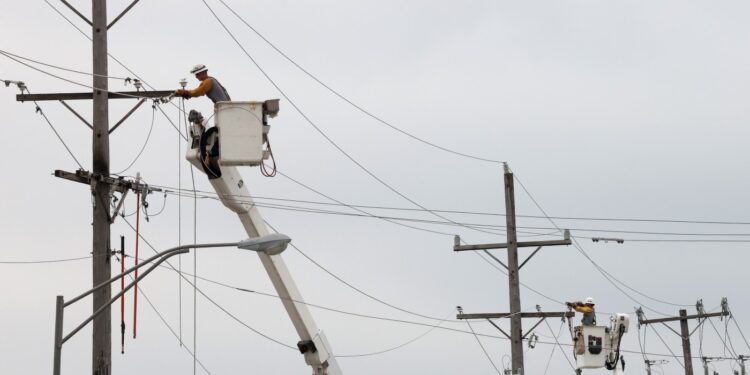
The Illinois Commerce Commission on Thursday approved a revised multi-year power grid improvement plan that would increase electric bills for Commonwealth Edison customers by more than $600 million over four years, 11% less than the utility proposed.
The decision comes a year after the ICC rejected another grid plan from ComEd — which would have been more costly for consumers — for reasons that included a failure to show the cost-effectiveness of proposed system investments and not fully complying with the clean-energy goals set by Illinois’ ambitious Climate and Equitable Jobs Act.
At the time, the utility’s plan projected a fivefold jump in solar power systems, increased demands from electric vehicles and the need for infrastructure upgrades to address severe weather caused by climate change.
The plan from ComEd approved by the ICC would require $3.3 billion in investments and improvements needed to strengthen power grid reliability.
The ICC said the effect of its decision on individual customers would vary based on service class and energy usage. But the commission also said that despite the lower utility rate increase for the next four years of $606 million, ComEd’s return on equity, or its profit rate, of 8.9% would not change.
“After extensive review, the Commission is confident that both ComEd and Ameren have the tools necessary to make needed investments to drive the clean energy transition and continue modernizing Illinois’ electric grid. These plans are a key component to meeting the goals of CEJA and represent significant improvement in meeting its requirements,” ICC Chairman Doug Scott said in a statement Thursday. “The investments approved today will deliver significant benefits to the utilities’ customers in an affordable, cost-effective manner.”
In December 2023, the ICC rejected ComEd’s multi-year grid improvement plan and slashed its proposed $1.47 billion rate increase, approving a $506 million rate increase over four years and ordering the utility to return with a refiled grid plan.
In March, ComEd refiled a plan that sought a $1.18 billion rate increase, including the $506 million already approved and an additional $678 million over four years. On Thursday the ICC reduced the additional rate increase by 11% to $606 million.
A ComEd spokesperson said in a statement that the utility was reviewing the order and trying to get a “comprehensive understanding of its findings and their implications.”
“Our initial understanding of this decision is that it appears to provide us with the necessary direction and certainty needed for critical grid investments and to enable Illinois’ ambitious clean energy and economic development goals laid out in the landmark Climate and Equitable Jobs Act (CEJA),” the spokesperson, John Schoen, said in the statement.
Signed into law by Gov. JB Pritzker in 2021, the Climate and Equitable Jobs Act requires utilities like ComEd in northern Illinois and Ameren, which covers downstate areas, to propose grid-improvement plans to push toward progress in meeting the law’s clean-energy goals.
Jim Chilsen, a spokesperson for the Citizens Utility Board, raised concerns about how any rate hike would affect customers but indicated that the ruling was a step in the right direction, saying in a statement that the ICC “has cut ComEd’s wasteful spending by hundreds of millions of dollars, reduced the company’s proposed rate hike and held its profit rate for shareholders at 8.905% — down from the ridiculous 10.5-10.65% ComEd had proposed in its first grid plan last year.”
In 2022 the ICC approved a $199 million increase for ComEd, adding roughly $2.20 per month to the average residential customer bill last year. That increase also was the last under the 2011 Smart Grid law, a 10-year program that granted ComEd control over customer-funded investments to improve its power grid.
At the time ComEd cited the shift to electrification and climate change for its proposal to increase rates in 2023, the utility was in the middle of political upheaval after agreeing three years earlier to pay a $200 million fine and cooperate with federal prosecutors in their probe of Springfield lobbying practices and an alleged scheme to bribe former Illinois House Speaker Michael Madigan. Four other people, including a top ComEd official and utility lobbyists, were convicted last year of bribery and record falsification.
Exelon, the utility’s parent company, agreed to pay a $46.2 million civil penalty to the U.S. Securities and Exchange Commission to settle fraud charges in connection with the scheme. Madigan, meanwhile, is on trial on racketeering charges that include what authorities say was his role in the ComEd bribery allegations.
Originally Published:






